Global Media Forum explores economic values and media
The 2013 Deutsche Welle Global Media Forum is underway in Bonn this week.
The theme of this year’s forum is The Future of Growth – Economic Values and the Media
“Experts from the fields of politics, business, finance, culture, academia, civil society and the media will jointly explore fundamental concerns, such as: What opportunities are presented by new economic values? Is growth imperative to increasing prosperity? How can the media help to raise awareness of sustainable consumption and responsible use of resources? How can fair competition be assured at local, regional, national and international levels? Can interaction between stakeholders be improved? What potential do digital media have to inspire interactive participation in the economic dialogue, especially among younger generations?”
![]() read more
read more
Reporting about people with disabilities
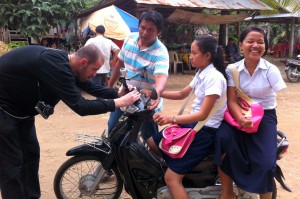 In many societies, people with disabilities are pushed aside – be they mentally challenged or physically impaired. Some of them have to beg for money in the streets, others stay out of sight or are even locked away.
In many societies, people with disabilities are pushed aside – be they mentally challenged or physically impaired. Some of them have to beg for money in the streets, others stay out of sight or are even locked away.
In Cambodia, the country’s Disability Action Council (DAC) estimates that nearly five percent of the population of 14.9 million people is disabled. According to the UN Economic and Social Commission for Asia and the Pacific (UNESCAP), Cambodia’s high disability rates can be attributed to three main factors:
• “past war casualties
• the ongoing risk of mines,
• the lack of prevention and primary care for various disabling diseases.”
The Cambodian media don’t often deal with the lives of the disabled. One reason may be shyness or ignorance on the part of the journalists about the life of people with disabilities. But two recent television training workshops have helped improve the way journalists portray people with disabilities in the media. They were jointly organized by DW Akademie, Germany’s GIZ and the Women’s Media Centre of Cambodia.
![]() read more
read more
DW fellows see sustainable value in project
Six Indian journalists have taken stock of their seven-week fellowship at DW Akademie in Bonn. The Meeting and Exchange Project Grow.Green.India, financed by the Robert Bosch Stiftung, not only changed their image of Germany, but also provided them with new inspiration and ideas: for their country, for their journalistic work and – not least – for their own contributions for a “sustainable” future of our planet. Click on the pictures to see the videos.

![]() read more
read more
#OMS2012 – Novel training for North African citizen journalists
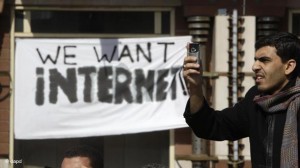 The DW Akademie is sponsoring a six-week open online course for citizen journalists from North Africa, the Maghreb and beyond. The Open Media Summit is using the innovative format of a massive online open course (MOOC), available for the first time in the region, to offer citizen journalists and digital media activists the opportunity to discuss and explore up-to-date ideas. The course, implemented through Internet videos, online discussions and on social media, is open to all. Here, you’re likely to find answers to the new format in this interview with Holger Hank, who is directing the project from DW Akademie headquarters in Bonn, Germany.
The DW Akademie is sponsoring a six-week open online course for citizen journalists from North Africa, the Maghreb and beyond. The Open Media Summit is using the innovative format of a massive online open course (MOOC), available for the first time in the region, to offer citizen journalists and digital media activists the opportunity to discuss and explore up-to-date ideas. The course, implemented through Internet videos, online discussions and on social media, is open to all. Here, you’re likely to find answers to the new format in this interview with Holger Hank, who is directing the project from DW Akademie headquarters in Bonn, Germany.
![]() read more
read more
Indian fellowship program concludes in Bonn
The multimedia site “grow.green.india” is the productive result of the Meeting and Exchange Project for Indian Journalists, which has just wrapped up in Bonn. For seven weeks, six journalists from across India enjoyed intense training in multimedia journalism and had ample opportunity to produce their own reports for the site.
![]() read more
read more
Six Indian fellows bound for Germany
DW Akademie together with Germany’s Robert Bosch Stiftung has wrapped up the selection process for its Meeting and Exchange Project for Indian Journalists . Almost 150 journalists from all across India applied for this project.
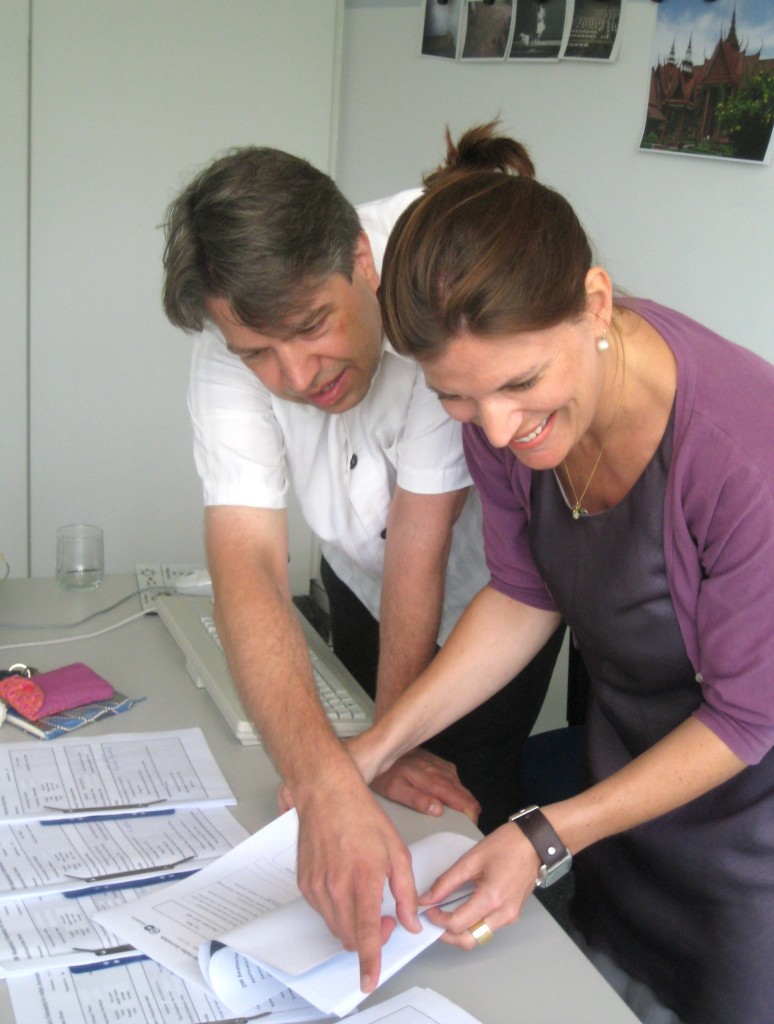
Applications are under review by project manager Patrick Benning (left) and head of DW-AKADEMIE's Asia division Dr. Andrea Rübenacker
The call for applications to the fellowship was launched online. The reaction to it by far exceeded all expectations. “We were extremely impressed by the high number of talented and qualified journalists applying,” says project manager Sabina Casagrande who spent two weeks evaluating the applications together with her colleague Patrick Benning. Both project managers admit they would have loved to invite more journalists to participate. “It was heartbreaking to have to reject so many promising candidates,” they say. However, six fellows between the ages of 25 – 35 will be heading to Germany in September for one-and-a-half months of journalistic and intercultural training. They will also be putting together a multimedia project on the topic of sustainability. Here’s a quick peek at the participants:
![]() read more
read more
Young Vietnamese benefits from studying in Germany
At this year’s Deutsche Welle Global Media Forum, we met up with Danh-Quy Nguyen, a Vietnamese who studied in Germany and now works as the Deputy Managing Editor for ELLE Vietnam. A few years ago, Danh-Quy was one of the first to receive a scholarship for the two-year Master’s program “International Media Studies” at DW Akademie.
You graduated from DW’s International Media Studies program last year. Now, you’ve been invited back as a guest and expert for a panel-discussion at the DW Global Media Forum. How does that make you feel?
Firstly, I feel great and honored to be invited by my teachers and colleagues. I think it’s an experience that not everyone can have. So I feel very happy. Secondly, I’m also very happy to see my old friends and many colleagues from Deutsche Welle.
What do you miss most about Germany?
What I miss most from Germany is lots of trees, lots of green and the Rhine River.
Can you apply the knowledge that you learned at DW to your work in Vietnam?
Of course! I learned a lot at DW and I use it in my work every day. The most important thing I learned from the DW Master’s program is how to communicate with people from different countries and different cultures. This is very important for my daily job. As Managing Editor, I have to communicate with different editors and people from the fashion industry all around the world.
![]() read more
read more
Teaching TV vox pops in Vietnam
A good interview should be informative, authentic, credible and sometimes even surprising. In the past two weeks, the participants in our workshop ‘Advanced Interview Training’ were able to discover the special benefits of this journalistic format.
Together with my colleague Uli Köhler, I am training journalists in the Vietnamese capital Hanoi. Our 15 trainees work for Vietnam Television (VTV). Most of them are reporters in Hanoi, but we’ve also got the VTV correspondents to Russia and to China in our group. All of our participants are keen to learn more about conducting interviews and recording vox pops.
As Uli and I will leave Vietnam in a couple of days, the trainees are now working on their final productions. Their topic is ‘same-sex marriage in Vietnam’. They chose this topic themselves after an hour-long discussion.
![]() read more
read more
Dix africains à Berlin – l’ultime étape de ‘Histoires Africaines’
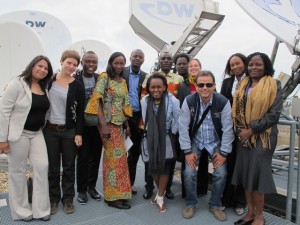 ” Ein, zwei, drei, …. Zehn. Ok tout le monde est là “, compte Stephie à l’entrée du métro sous le regard éberlué de tous, c’est-à-dire : Abiatou Oumarou du Benin, Khady Racine Diop du Sénégal, Elysée Ngindu Odia de la RDC, Madiha Boukal du Maroc, Ramata Konaté du Mali, Ibrahima Keita de la Guinée, Luigi Giovanni Temdie du Cameroun, Nestor Ebongo du Congo Brazzaville, Oumar Coulibaly du Burkina Faso et Taha Jemai de la Tunisie. Il s’agit des dix journalistes et techniciens audiovisuels venus à Berlin dans le cadre du projet ” Histoires Africaines “. Arrivés la veille, tous ont déjà subi le froid réfrigérant de l’été allemand. C’est donc bien équipé que la délégation africaine s’embarque pour une aventure à grande vitesse de 14 jours à Berlin.
” Ein, zwei, drei, …. Zehn. Ok tout le monde est là “, compte Stephie à l’entrée du métro sous le regard éberlué de tous, c’est-à-dire : Abiatou Oumarou du Benin, Khady Racine Diop du Sénégal, Elysée Ngindu Odia de la RDC, Madiha Boukal du Maroc, Ramata Konaté du Mali, Ibrahima Keita de la Guinée, Luigi Giovanni Temdie du Cameroun, Nestor Ebongo du Congo Brazzaville, Oumar Coulibaly du Burkina Faso et Taha Jemai de la Tunisie. Il s’agit des dix journalistes et techniciens audiovisuels venus à Berlin dans le cadre du projet ” Histoires Africaines “. Arrivés la veille, tous ont déjà subi le froid réfrigérant de l’été allemand. C’est donc bien équipé que la délégation africaine s’embarque pour une aventure à grande vitesse de 14 jours à Berlin.
![]() read more
read more
Children’s television: Is it ok to break things on TV?
Three young Dutch boys dismantle an old industrial scale in a backyard. The kids use dad’s toolbox and take the old potato scale apart, exploring the individual parts and finding out how it works. At the end they leave it and run to play.
The documentary-series Toolbox Kids Uit me kaar on children exploring disused appliances is a success in The Netherlands. However, for television producers from Kenya and Ghana it might be unthinkable to let children “destroy” something that is still working as an idea of educational TV for children.
![]() read more
read more





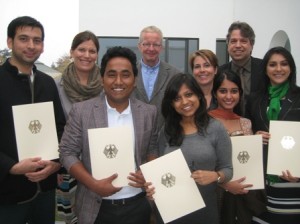
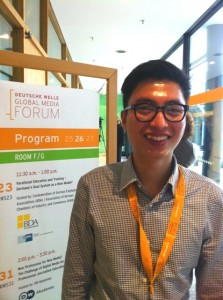
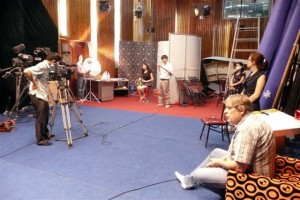
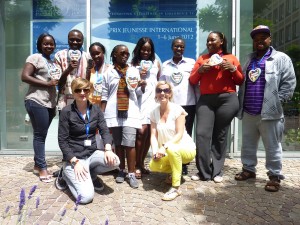




Feedback